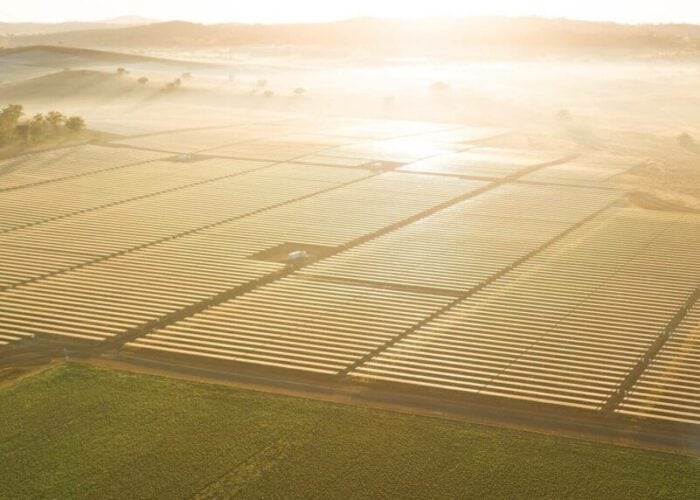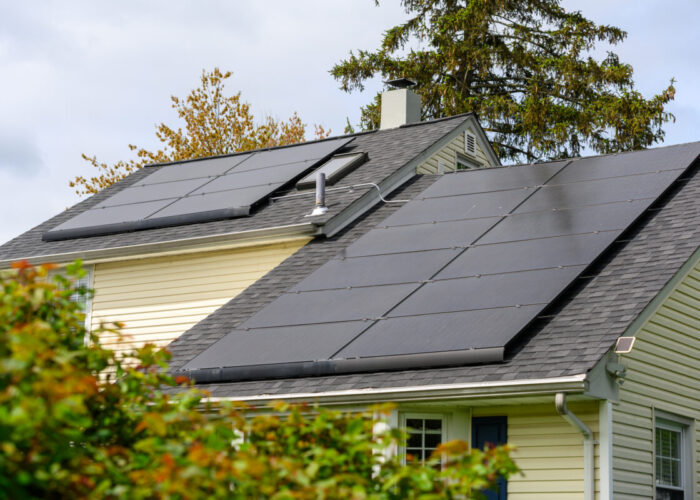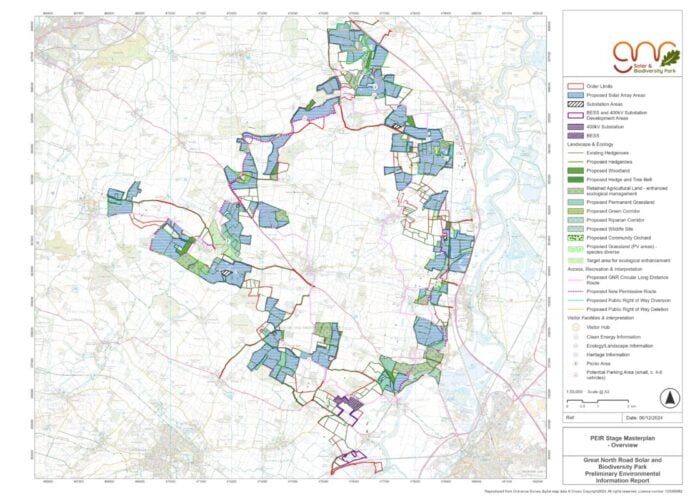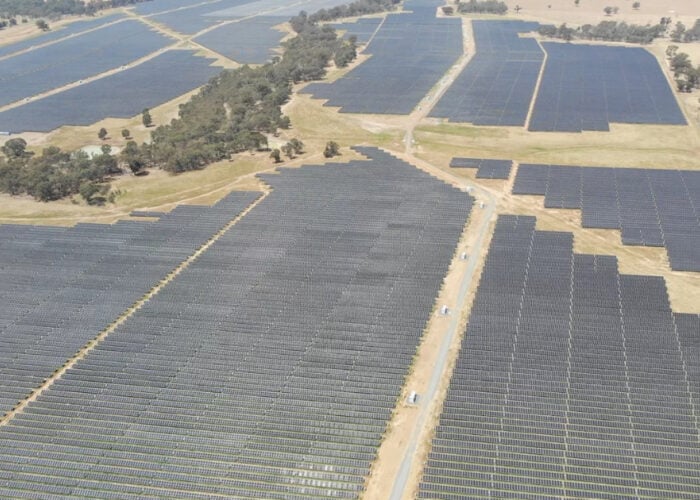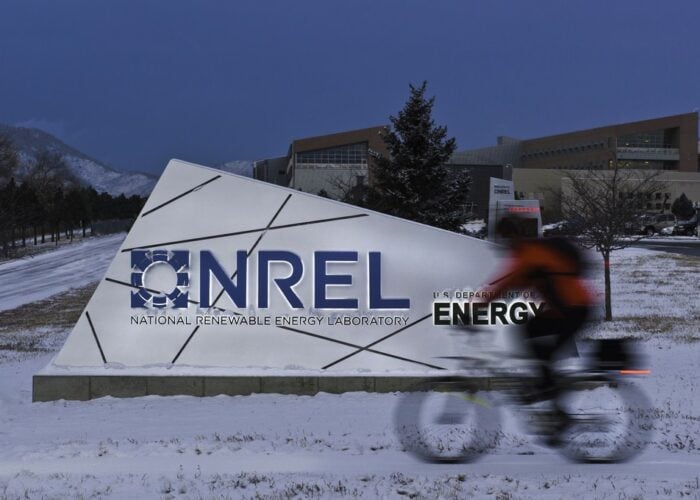North Carolina is not a sunny state. But the SEIA ranks it third nationally for solar installations, and according to the Sierra Club, solar is outpacing all other energy sources in the state.
Just in the last few months, NC a announced 64MW of solar as under construction, utility Duke Energy launched a US$500 million solar commitment, and the state recently approved the interconnection of an 80MW solar power plant and 52MW of solar is to power its universities.
Unlock unlimited access for 12 whole months of distinctive global analysis
Photovoltaics International is now included.
- Regular insight and analysis of the industry’s biggest developments
- In-depth interviews with the industry’s leading figures
- Unlimited digital access to the PV Tech Power journal catalogue
- Unlimited digital access to the Photovoltaics International journal catalogue
- Access to more than 1,000 technical papers
- Discounts on Solar Media’s portfolio of events, in-person and virtual
Or continue reading this article for free
Meanwhile electronics retailer giant, Apple, has been given the go-ahead to annex land in the city of Claremont, NC, in order to construct a 17.5MW solar farm, and banking giant Wells Fargo invested US$100 million of tax equity financing in nine PV projects to be built by Strata Solar.
The list goes on.
In the midst of state’s solar surge is the North Carolina Sustainable Energy Association (NCSEA).
The NCSEA has already conducted surveys to find NC is employing 18,404 full-time renewables workers and policy lobbies have helped provide US$4.7 billion in economic benefits and US$559 million in energy efficiency taxpayer savings from 2007-2013.
Lobbyist Betsy McCorkle, the NCSEA’s director of government affairs talked to PV Tech about the surprise solar state.
Q. What does the NCSEA do?
The NCSEA has been around since the 70s, we changed our focus a couple of times, right now we are focusing on driving public policy and market development to create clean energy jobs and economic opportunities for affordable energies to benefit North Carolina.
That basically means we are involved in a number of venues, the one where I am most active is the NC general assembly, and working for a public policy that will support the clean energy economy in NC, we are also involved in the NC utilities commission, as well as in a number of venues that are interacting with local government and universities and military. We really try to work from all angles, and help empower the space so we can have more clean energy in NC.
NCSEA really tries to be the connector in the middle, between businesses and people looking for jobs and government and universities. One way we stay like this is our annual conference, ‘making energy work’. The idea of the conference is to bring together everyone in one space, to convene people coming from different angles. Also what is good is, we are not preaching to the choir, there are people with lots of different opinions, but it gives a chance to connect on policies and finance, and there are people there that can help solve problems and help people take the next steps.
Q. And NCSEA helps facilitate that solar networking?
Absolutely. We know that no one organisation, or no one company or policy is going to be a silver bullet to developing clean energy in NC. It is going to take everybody, it’s going to take utilities, take policy and entrepreneurs and risk takers and we hope that we provide an opportunity for those minds to make that happen.
Q. What solar policy and market developments are you working on at the moment?
As you are probably aware, last year NC ranked second for newly installed solar and most of that right now is coming from the larger solar farms, although I use ‘large’ lightly as if you are out west, they would not think the solar farms are large! Most are coming in at 3-20MW, mostly around 5MW, these are about 40 acre solar farms and we get involved with helping create opportunities for this industry.
NC does also have a Renewable Energy Portfolio Standard (REPS) which requires the utilities to produce a certain amount of their retail sales from renewables – that was in 2008.
Another initiative in place a little over a year: we worked with the NC Clean Tech Center to develop a solar template ordinance that local government can adopt or modify to meet its needs. This really helps streamline the process of bringing these types of facilities into local government.
Sometimes we found that counties were trying to delay these projects, not because they didn’t like them or didn’t want them, but because they were new and required significant administration. So we worked with many stake holders to develop these ordinances and made great progress across the state for counties adopting them. This is allowing solar developers to come in and work in a streamlined way with local communities to get theses projects online.
Q. NCSEA created a template for local governments to look at, was this so they could see if solar is feasible?
That it is feasible, but also addresses some of their concerns, one of which is decommissioning. Another is about aesthetics and questions such as will these farms create any noise, or odour or glare? There are a lot of different issues we were able to work into these ordinances that we know how to address, then counties could keep people in their communities happy but still encourage more companies to come in and do this type of investment.
Q. What is the main selling point you use for a NC community that could benefit from solar?
One of the biggest benefits is that these projects are assets for the community; they are going to increase the tax bank which allows local governments to have more resources for things like schools or roads and whatever they need – but also this asset is going to create clean energy, but not increase traffic, noise, odour or pollution. There is this added benefit to the community without that additional burden that other types of economical developments sometimes bring.
Q. Can you tell me more about the decommissioning concerns?
Solar is still a relatively new industry in NC; we haven’t had solar facilities around for 30 or 40 years, so it is unclear what will happen to solar farms at the end of their life.
For example, it was recently found the scrap value of solar farms is actually worth three or four times more than the cost to take the farm apart. So while we want solar companies in NC to be very responsible and not abandon their projects, even in the worst case scenario, and they did abandon them, there is a sizable amount of money available for the local government to sell the parts for scrap that would far outweigh any cost associated with taking the plant apart. That has been very helpful in addressing concerns that somehow these solar projects will just be abandoned and left for the community.
Q. What are the major things people look to NC for when developing solar plants?
I think there is a lot of things, one is we have a favourable policy environment, our legislators and policy makers on both sides of the aisle actually get a lot of credit for encouraging these types of investments in NC.
Another thing is that we also have a trained solar workforce in NC now, so you do not have to train people that do not have experience, someone can come in and access a trained workforce.
Another benefit of NC is that as projects are starting to be developed outside the state, NC is actually a hub for the solar workforce and solar expertise, so workers can leave the state and go do projects, but those jobs and companies stay in NC, which is very helpful to our economic recovery.
Q. How is NC ranked so high in solar installations, despite more southern states having more sunshine?
It goes back to policy and having a favourable policy that allows companies and entrepreneurs to come in and develop projects. Certainly the REPS, created a market for these technologies and forces companies to come in and compete on price, which has driven the cost down of doing renewable energy projects in NC. That makes it a very attractive place to do these projects because cost has come down, there is a renewable energy workforce and we have those requirements to participate in that space.
Q. What work do you do with the utilities commission?
In NC and the south east, utilities are heavily regulated; it is referred to as a ‘regulatory monopoly’, therefore the traditional free market forces of supply and demand that would normally drive a lot of this activity are not present. There are a lot of rules in place. There are rules about what the utilities can take for this type of technology, where it can be connected to the grid, different things about sizes, times of the day, times of the year, when this type of electricity is useful for these utilities and their customers.
All of these rules are designed and implemented through the NC commission, so renewable energy companies and other stakeholders want to be able to invade in a formal way, with the utilities. It is not a traditional environment where you work out your differences customer to customer, there really is only one customer for this type of power; renewable companies in NC can only sell power to the utilities, they cannot sell it to a third party, they only have one customer, so they rely on the commission to make sure the trading is fair.
Q. Is there net metering in NC?
There is, there is some uncertainty as to if that will continue, we believe that it is fair to the solar industry and is compensating those that are willing to take a risk and support renewable energy at their homes. This is bringing power out into the rural areas and reducing energy inefficiency and line losses from having to have power travel long distances. Utilities have indicated changing the rules on net metering, we have not seen a proposal on that yet, but NCSEA plans to engage with that debate and discuss any possible changes to net metering.
Q. When is net metering expected to be examined by utilities?
It is the big one right now; we do anticipate utilities filing to change net metering probably by the end of the year.
Q. What is NC's REPS target?
It is 12.5% from renewables, and energy efficiency, by 2021.
Q. What is the main energy source in NC at the moment?
Coal and nuclear. Biomass is gaining ground.
Q. What other renewables are popular?
Hydro power has been in place for a long time in NC it’s seen as the pioneer of renewables but we have not seen a lot of new hydro being brought online. A lot of the new projects we are seeing is solar and biomass.
Q. What are electricity prices like in NC?
The residential retail level is between 9 and 13 cents a kWh.
Q. Does that go up or down with solar, is there a long term trajectory to bring down costs?
We don’t anticipate the cost of energy going down in NC. It’s not the trajectory we have been on.
One of the benefits of solar is when Power Purchase Agreements are put in place; utilities are locking in the cost of solar power long term. It provides stability.
A study last year recently showed sticking with the REPS in NC, allows for US$173 million cost saving, just by having renewable energy in the portfolio.
Q. What barriers is NCSEA working on at the moment?
A number of things that we continue to work with local governments to implement are model ordinances, or working with local government to tweak it to be the best suited to their needs.
We are also working with state officials to discuss the situation of the renewable energy investment tax credit set to expire next year. We are trying to discuss what is next, to continue encouraging the types of investment that we are seeing.
In solar alone over US$1.5 billion has been invested in this state. Much of which is going out to rural, and economically depressed communities, many officials are very interested in discussing this.
Q. What are NCSEA’s hopes for the tax credit being revived?
It’s something we are working on to get the best solution to meet the needs of the industry, while keeping in mind what is fiscally responsible.
Q. You mentioned the US military previously, who have been quite active in solar, what are the military’s plans for solar in NC?
In NC the bases here have expressed a lot of interest in having on site renewable energy generation; one example is a marine core here in NC that has solar thermal systems on the bases’ housing. The idea is to help cut costs for the base in providing hot water services to housing, that is a very unique and innovative design that is utilising renewable energy to cut costs.
Q. Any other headline solar targets from NCSEA?
Our big concern and focus, is helping meet demand, these free market forces of supply and demand do not exist in NC, so it will take a lot of discussion and finding out what a lot of people would like to see from the utilities, so instead of us saying a percentage of solar by a certain date, we are trying to help customers meet their demand – if it is universities or military or local government or just individual consumers, we want to push for an environment that pushes for those demands.

